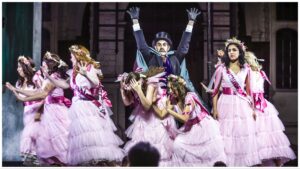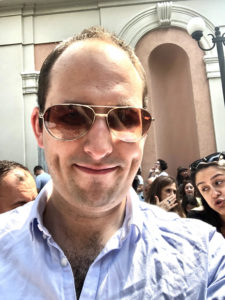
Opera Holland Park 2023 Review: Ruddigore
Gilbert & Sullivan Melodrama Parody is the Latest Smart Co-Production with Charles Court Opera
By Benjamin Poore(Photo: © Craig Fuller)
Opera Holland Park’s last show this summer was Gilbert and Sullivan’s “Ruddigore.” This was their third co-production with G&S specialists, Charles Court Opera, following last year’s “HMS Pinafore.” Again, it is directed by John Savournin, who also plays a leading role, with David Eaton conducting the City of London Sinfonia in one of the duo’s more Gothic, darkly-hued pieces.
An Unusual Work
“Ruddigore” is an unusual work. A chorus of professional bridesmaids lament the fact that they’re out of work. A betrothal is thwarted, reunited, and then thwarted again by the bad baronet Sir Despard Murgatroyd, who is forced by his ancestor’s to do an evil deed each day. He manages to pass the responsibility to his long-lost brother Ruthven, formerly Robin, Murgatroyd. Gilbert turns the conventions of melodrama on their head: good people are turned to evil, evil to good, and the ending is a miraculously happy one. Sullivan enjoys plenty of musical looks referencing Donizetti, Verdian grand opera, and music from his own “Pinafore.” Along with the madrigal-esque English ballads of his own idiom, “Ruddigore” contains some of the darkest music he ever wrote.
Given that melodrama as a genre really didn’t make much of a popular headway, beyond its nineteenth-century zenith, the parodic elements have a bit less bite than the perennial satirical targets of G&S. These include tortuous bureaucracy, fatuous authority figures, or the law, and work that is less evenly plotted than “Mikado” or “Pirates.” Along with its final paradoxical reversal of fortunes coming over as a bit, well, melodramatic.
Savournin’s solution is to go feet-first, cleaving relatively traditionalist. This is characteristic of Charles Court Opera’s approach and not doing a hatchet job on the dialogue or language, as we have seen in heavily updated versions from Cal McCrystal at English National Opera in recent seasons. Diction is fine in both sung and spoken sequences and the comic timing spot on. There is a wryness about the material, but never contemptuous exaggeration. Except in the high camp climax of the entry of ghosts in Act two, which goes deliciously Hammer Horror, helped by Stephen Gadd’s Christopher Lee-inspired turn as the bloodstained Sir Roderic Murgatroyd. Other characters are boldly drawn. Heather Lowe as Mad Margaret is convincingly, even pathetically, unhinged in Sullivan’s parodic treatment of “Lucia di Lammermoor.” David Webb as Dick Dauntless, despite a couple of slippages with his accent, bounds about with the abandon of a cocker spaniel. He is both daft and priapic.
There are a few spicy touches in this production, too. “I once was a very abandoned person” sees Despard and Margaret surreally transfigured into repressed, tweed-and-polo-neck wearing homeowners straight out of a 1970s public information film. In the refrain, they do jerky robotic dancing. This is done with utmost seriousness and therefore maximizes the hilariousness. In the melodrama scene of Act two, conductor David Eaton goes to the piano in the pit to play the accompaniment. It is a nice historical nod to its roots, but also suggestive, perhaps, of the silent movies that subsequently fed off the genre. The setting, more broadly, sat somewhere in the Edwardian period. This was done to perhaps suggest the dying days of English aristocracy, represented in the run-down Murgatroyd mansion.
Savournin’s Despard Murgatroyd was brilliantly drawn, with a mustache, top hat, and cape that is surely a knowing nod to Jack Lemmon’s Professor Fate in “The Great Race.” Itself a send-up of silent-era pantomime villains. He remains one of the finest comic singing actors in the country. He is an exemplary pompous straight man with an anarchic streak. As director, his own highly-disciplined movement clearly feeds into the capable dancing on display from principals and chorus.
Even with a large chorus, the broad and open space of the Holland Park stage can be a challenge to animate. Merry Holden’s choreography did so with imagination and verve. There was a lot of energetic back-and-forth between upstage and the downstage apron around the orchestra. David Webb’s hornpipe, with professional bridesmaids in tow, was a particular highlight. This was played completely straight and traditional, but all the funnier for it. The execution is fine, no doubt, and in line with the high standards of Charles Court Opera. But, “Ruddigore” feels like it calls for a more invasive, experimental treatment to bring it up to the comic heights of their other stagings. It is cursed, perhaps, by its own tonal and formal complexities.
Plenty of Fizz
Voices, as ever with this company, have plenty of fizz. Matthew Kellett as Ruthven/Robin Murgatroyd has a textbook light baritone and impressive patter skills in the Act three trio, “My eyes are fully open.” His Act one duet with Rose Maybud was endearingly honeyed. As an acting presence, he has a slightly vulnerable and wounded quality that contrasts well with his rival Dick Dauntless, who is helpfully taller and beefier. Llio Evans sings Rose with bright vivacity and equally winning warmth and evenness. Savournin himself is fruity and oaky, bubbling away terrifically in the patter, and boasting a fine lyric voice elsewhere that would be a pleasure to hear in a Sarastro.
David Webb’s Richard Dauntless may be an idiot, but heroically performed. His tenor has a burnished and baritonal quality. It was all polished bronze, proving that so-called “light” music should always call for serious singing. Likewise, Heather Lowe’s Mad Margaret was sung with laser-like intensity and focus. Lowe’s performance had a tight, powerful core to the sound and brilliant contrasts of dynamic and texture.
Stephen Gadd’s Roderic Murgatroyd was full of stentorian ping and steel. It was as if he’d just walked onstage from some middle-period Verdi opera. His long-lost love Dame Hannah was sung by Heather Shipp‘s richness of sound and fulsome lower register made for a surprisingly moving penultimate number in the second half. G&S legend Richard Suart still very much delivers the goods as a character singer, with some rougher edges all proving part of the charm.
The slender chorus sang with gusto. Even the smaller group of tenors and basses proved impressively ominous. Everyone performed with Verdian grandeur and declamation, especially when stepping out of their portraits in Act two. Smaller numbers can be a virtue when a director like Savournin allows a chorus more vibrantly drawn and delineated characterization, which it had in spades. David Eaton, apart from playing a mean piano, conducted the City of London Sinfonia with class and lightness. Although, the darker mood of the piece probably calls for a heavier string sound than afforded by the smaller forces that evening.



